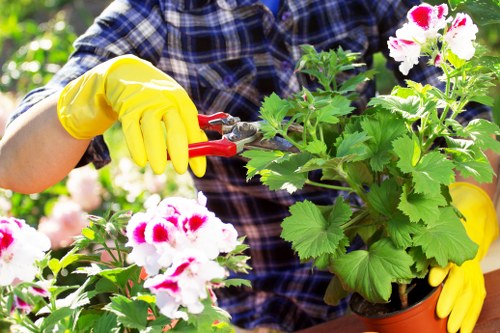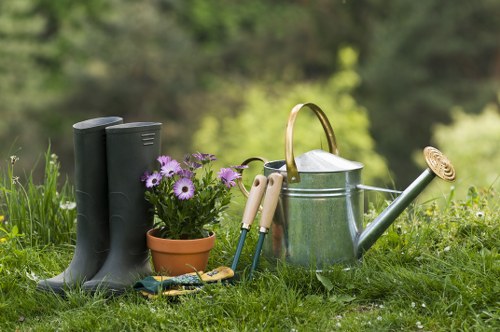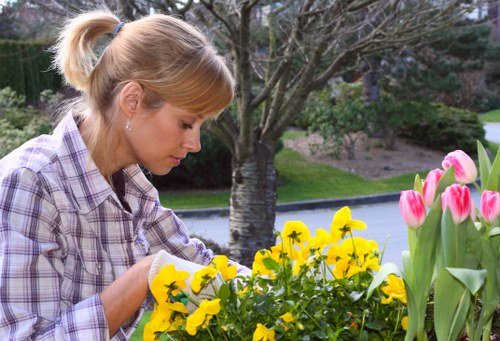Driveway Algae Removal in Chelmsford: Keep Your Driveway Clean and Safe

Algae growth on driveways is a common issue faced by many homeowners in Chelmsford. Not only does it make your driveway look unsightly, but it can also pose safety hazards, especially when it becomes slippery after rain or dew. Understanding how to effectively remove and prevent algae can help maintain the aesthetic and functionality of your driveway.
In this article, we'll explore the causes of driveway algae, methods for removal, and tips for prevention. Whether you prefer a DIY approach or hiring professionals, this guide will provide you with the knowledge you need to keep your driveway algae-free.
Let's delve into the world of driveway maintenance and discover how to tackle algae growth efficiently and sustainably.
Understanding Driveway Algae

Before diving into removal techniques, it's essential to understand what causes algae to thrive on driveways and why it's important to address the issue.
Algae are simple plants that thrive in moist, shaded environments. Driveways, especially those with cracks or porous materials, provide an ideal breeding ground for algae due to the accumulation of moisture and debris.
- Moisture: Damp conditions after rain or dew create the perfect environment for algae spores to germinate.
- Shade: Areas with limited sunlight allow algae to flourish without the natural drying effects of the sun.
- Organic Material: Leaves, twigs, and other debris can trap moisture and provide nutrients for algae growth.
What Causes Algae Growth on Driveways?
Algae spores are ubiquitous in the environment, carried by wind and water to new locations. When these spores land on a suitable surface, like a driveway, and conditions are right, they begin to grow. Factors contributing to algae growth include:
- High moisture levels
- Lack of sunlight
- Presence of organic debris
- Warm temperatures
Why is Algae Removal Important?
Removing algae from your driveway is crucial for several reasons:
- Safety: Algae can create slippery surfaces, increasing the risk of slips and falls.
- Aesthetics: Algae stains can make your driveway look neglected and reduce your property's curb appeal.
- Structural Integrity: Prolonged algae growth can contribute to the deterioration of driveway materials, leading to cracks and surface damage.
Methods for Driveway Algae Removal

There are various methods available for removing algae from driveways, each with its advantages and considerations. Depending on your preferences and the extent of algae growth, you can choose the most suitable option.
From chemical treatments to eco-friendly solutions, understanding the pros and cons of each method will help you make an informed decision.
Let's explore the different techniques available for algae removal.
Chemical Cleaning Solutions
Chemical cleaners are a popular choice for algae removal due to their effectiveness and speed. These solutions typically contain bleach or other powerful agents that kill algae spores on contact.
- Pros: Quick results, highly effective in removing persistent algae.
- Cons: Can be harmful to surrounding vegetation, pets, and the environment if not used properly.
When using chemical solutions, it's essential to follow the manufacturer's instructions carefully and take necessary safety precautions, such as wearing gloves and protective eyewear.
Eco-Friendly Algae Removal Techniques
For those looking to minimize environmental impact, eco-friendly algae removal methods offer a safer alternative. These techniques use natural ingredients like vinegar, baking soda, or hydrogen peroxide to eliminate algae without harmful side effects.
- Pros: Safe for pets and plants, environmentally friendly.
- Cons: May require more time and effort compared to chemical cleaners.
Eco-friendly solutions are ideal for homeowners who prioritize sustainability and want to maintain a green lifestyle while keeping their driveways clean.
Pressure Washing for Algae Removal
Pressure washing is another effective method for removing algae from driveways. This technique uses high-pressure water jets to dislodge and wash away algae, dirt, and debris.
- Pros: Non-chemical, thorough cleaning, and can restore driveway surfaces.
- Cons: Requires access to a pressure washer and can be labor-intensive.
Pressure washing is suitable for various driveway materials, including concrete, asphalt, and pavers. It not only removes algae but also revitalizes the appearance of your driveway.
Hiring Professional Services in Chelmsford

While DIY methods are effective, sometimes hiring professionals is the best approach, especially for extensive algae problems.
Professional driveway cleaning services in Chelmsford offer expertise, specialized equipment, and tailored solutions to address your specific needs.
Here's why considering professional help can be beneficial:
Benefits of Professional Algae Removal
- Expertise: Professionals have the knowledge and experience to handle various algae-related issues.
- Advanced Equipment: Access to high-quality tools and cleaning agents ensures a thorough cleaning process.
- Time-Saving: Professionals can complete the job efficiently, saving you time and effort.
- Long-Term Solutions: Experts can provide recommendations for preventing future algae growth.
Choosing the Right Service Provider
When selecting a driveway cleaning service in Chelmsford, consider the following factors:
- Reputation: Look for companies with positive reviews and testimonials.
- Experience: Choose services with a proven track record in algae removal.
- Pricing: Compare quotes to find a service that fits your budget without compromising quality.
- Eco-Friendly Options: If sustainability is important to you, opt for providers that use environmentally friendly products.
DIY Driveway Algae Removal Tips

If you prefer a hands-on approach, several DIY methods can effectively remove algae from your driveway. With the right tools and techniques, you can achieve impressive results without professional help.
Here are some practical tips to guide you through the process:
Implementing these DIY methods can help you maintain a clean and safe driveway, enhancing your property's overall appeal.
Step-by-Step Cleaning Guide
- Prepare the Area: Remove any vehicles, outdoor furniture, or other items from your driveway.
- Clear Debris: Sweep away leaves, twigs, and other debris using a broom or leaf blower.
- Apply Cleaning Solution: Whether using a chemical cleaner or an eco-friendly solution, apply it evenly across the affected areas.
- Scrub the Surface: Use a stiff-bristle brush to scrub the algae-stained areas thoroughly.
- Rinse Thoroughly: Use a garden hose or pressure washer to rinse away the cleaning solution and loosened algae.
- Dry the Driveway: Allow the driveway to dry completely to prevent future algae growth.
Preventative Measures to Avoid Algae Growth
Prevention is key to minimizing algae recurrence. Implementing these strategies can help keep your driveway algae-free:
- Improve Drainage: Ensure proper drainage to reduce moisture accumulation on your driveway.
- Increase Sunlight Exposure: Trim overhanging branches and remove obstacles that block sunlight.
- Seal Your Driveway: Applying a sealant can create a protective barrier against moisture and algae.
- Regular Cleaning: Periodically clean your driveway to remove organic debris and prevent algae from taking hold.
Costs Associated with Algae Removal in Chelmsford

Understanding the costs involved in algae removal can help you budget effectively, whether you're opting for a DIY approach or hiring professionals.
Costs can vary based on factors such as the size of your driveway, the extent of algae growth, and the chosen removal method.
Let's break down the typical expenses associated with algae removal in Chelmsford.
Average Pricing for Services
Professional driveway cleaning services in Chelmsford typically charge based on the size and condition of the driveway. On average:
- Small Driveways: £50 - £100
- Medium Driveways: £100 - £200
- Large Driveways: £200 - £400
Additional services, such as sealing or applying preventative treatments, may incur extra costs.
Cost-Effective Solutions
If you're looking to save money, consider the following cost-effective algae removal strategies:
- DIY Cleaning: Using household items like vinegar and baking soda can reduce expenses.
- Regular Maintenance: Preventative measures can minimize the need for extensive cleaning.
- Combine Methods: Using a mix of mechanical and natural cleaning techniques can maximize efficiency without high costs.
Local Relevance: Driveway Algae Removal in Nearby Areas

Chelmsford is surrounded by several towns and villages that may also face similar algae issues. Understanding the local context can help residents find the best solutions for their specific areas.
Here are some nearby areas to Chelmsford where driveway algae removal services are also in demand:
- Great Baddow: Just a few miles from Chelmsford, Great Baddow offers a mix of residential and commercial properties that require regular algae maintenance.
- Shelford: Known for its scenic views, Shelford residents often seek eco-friendly algae removal methods to preserve the natural beauty of their driveways.
- Marconi Campus: The Marconi area has a bustling community with a need for efficient and reliable driveway cleaning services.
- Feering: Feering's historic charm attracts homeowners who prefer traditional and safe algae removal techniques.
- Writtle: Writtle's close-knit community benefits from local service providers offering personalized algae removal solutions.
- Water End: With its mix of new and old properties, Water End residents require versatile cleaning methods to handle different driveway materials.
- Runwell: Runwell's suburban layout makes it a prime area for regular driveway maintenance and algae prevention.
- Wickford: As one of the larger nearby towns, Wickford has numerous driveways needing professional algae removal services.
- Galleywood: Galleywood homeowners prefer eco-friendly solutions to maintain their driveways without harming the surrounding environment.
- Little Baddow: Little Baddow's residential areas often seek cost-effective algae removal options to keep their driveways clean.
- Stanway: Stanway faces similar challenges with algae growth, especially in shaded driveway areas.
- Laindon: Laindon's diverse properties require adaptable algae removal techniques to suit different driveway surfaces.
- Burnham-on-Crouch: Being a coastal town, Burnham-on-Crouch deals with extra moisture levels, making algae removal essential.
- Paglesham: Paglesham residents often combine algae removal with other driveway maintenance tasks for overall longevity.
- South Woodham Ferrers: This area benefits from professional services that offer comprehensive algae and driveway cleaning packages.
Maintaining a Clean Driveway Post-Algae Removal
After successfully removing algae from your driveway, maintaining its cleanliness is essential to prevent future growth.
Implementing a regular maintenance schedule and protective measures can extend the lifespan of your driveway and keep it looking pristine.
Regular Cleaning Schedule
Establishing a routine cleaning schedule helps in managing algae growth effectively. Consider the following tips:
- Seasonal Cleaning: Clean your driveway at least twice a year—typically in the spring and fall.
- Quick Debris Removal: Regularly sweep your driveway to remove leaves, dirt, and other debris that can trap moisture.
- Spot Cleaning: Address algae stains as soon as they appear to prevent widespread growth.
Sealing Your Driveway
Applying a sealant to your driveway creates a protective barrier against moisture and algae spores. Benefits of sealing include:
- Prevents Moisture Penetration: Sealants reduce the amount of water that can seep into driveway materials, limiting algae growth.
- Enhances Durability: Sealing extends the lifespan of your driveway by protecting it from environmental damage.
- Improves Appearance: A sealed driveway has a polished and maintained look, boosting your property's curb appeal.
It's recommended to seal your driveway every few years, depending on the material and weather conditions.
Conclusion
Maintaining a clean and safe driveway is essential for both aesthetic appeal and functional integrity. Algae growth, while common in Chelmsford and its surrounding areas, can be effectively managed through a combination of removal techniques and preventative measures.
Whether you choose to tackle the issue yourself or hire professionals, understanding the causes and solutions for driveway algae is the first step toward a pristine driveway. Regular maintenance, proper cleaning, and protective actions will ensure your driveway remains free from algae and looks its best year-round.
Frequently Asked Questions
Q1: How often should I clean my driveway to prevent algae growth?
A1: It's recommended to clean your driveway at least twice a year, typically in the spring and fall. Regular sweeping and prompt spot cleaning can also help prevent algae from taking hold.
Q2: Are eco-friendly algae removal methods as effective as chemical solutions?
A2: Yes, eco-friendly methods such as using vinegar, baking soda, or hydrogen peroxide can be effective, especially when applied consistently. While they may require more effort and time, they offer a safer alternative for the environment and nearby vegetation.
Q3: Can algae damage the surface of my driveway?
A3: While algae itself doesn't directly damage driveway materials, the moisture it retains can contribute to the deterioration of surfaces over time. Prolonged moisture can lead to cracks, erosion, and weakening of the driveway structure.
Q4: Is it necessary to seal my driveway after algae removal?
A4: Sealing your driveway is highly recommended as it creates a protective barrier against moisture and algae spores. It also enhances the durability and appearance of your driveway, reducing the likelihood of future algae growth.
Q5: When should I consider hiring a professional for algae removal?
A5: If your driveway has extensive algae growth, stubborn stains, or if you're looking for a quick and thorough cleaning solution, hiring a professional service in Chelmsford can be beneficial. Professionals have the expertise and equipment to handle more challenging cleaning tasks efficiently.
Frequently Asked Questions
Learn effective methods for driveway algae removal in Chelmsford. Discover DIY tips, professional services, costs, and maintenance strategies to keep your driveway clean and safe.
Get A Quote

